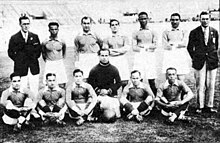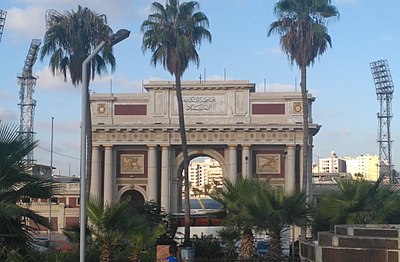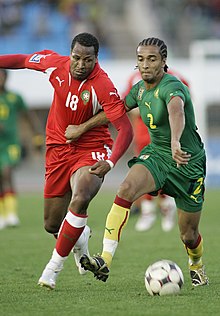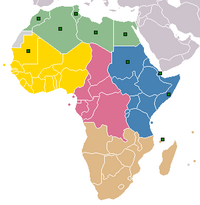Portal:Football in Africa
Introduction
Football is the most popular sport in Africa. Indeed, football is probably the most popular sport in every African country, although rugby and cricket are also very popular in South Africa. (Full article...)
This section may be unbalanced toward certain viewpoints. (October 2022) |

Selected article -
Al-Merrikh Sporting Club (Arabic: نادي المريخ الرياضي) is a Sudanese professional football club based in the city of Omdurman. Their home stadium is Al-Merrikh Stadium, which is locally known as The Red Castle. Founded in 1908, Al-Merrikh is one of the oldest football clubs in Africa. They have won the Sudan Premier League 22 times and Sudan Cup 26 times. The club has a fierce rivalry with Al-Hilal with the games between them regularly selling out, as well as being the only other realistic challenger to the league crown. They won the Om-al-Dahab championship in 1965 and are the only team to have ever won this one time event. Al-Hilal is also based in Omdurman with only Al-Ardha Street separating the teams. Between them they are Sudan's most powerful and successful football clubs.
Selected biography -
Lemina began his career in France with the Lorient youth academy at the age of 11; he was later promoted to the first team during the 2012–13 season, his only season with the club. The following season, he joined Marseille for €4 million, although he initially struggled to gain playing time in his first year with the club, making only eight league starts during the 2013–14 season. He began to be used more frequently by manager Marcelo Bielsa during the 2014–15 season, making his breakthrough with the club as he helped the team to a fourth-place finish. On 31 August 2015,Juventus announced the signing of Lemina on a season-long loan for €500,000 with an option to buy for €9.5 million at the end of the 2015–16 season, in which he helped his team achieve a domestic double. His loan was made permanent in April 2016. On 8 August 2017, Lemina joined Southampton on a five-year deal for a club record fee of £15.4 million.
Lemina represented France at under-20 and under-21 level, winning the 2013 FIFA U-20 World Cup before opting to represent Gabon at senior level in June 2015. He scored on his international debut in a 3–3 friendly draw against Tunisia on 9 October 2015.
Selected image -
 |
A view of the Alexandria Stadium, taken in 2016. Built in 1929, Alexandria Stadium is the oldest stadium in Africa, holding a capacity of 13,660 and serving as the home stadium for local club sides Al Ittihad and Smouha.
Subcategories
Related portals
More sports portals
WikiProjects
Related task forces and sub-projects
African football task force
WikiProject Africa • WikiProject Football
WikiProject Football task forces and sub-projects
 | |
| Wikipedia ads | file info – #250 |
Topics
Open tasks

- Expand stubs: Competitions in Africa • Organizations
- Expand club articles of teams from Africa.
- Expand biographies of Africans involved in football.
- Create: Requested articles • Most wanted football articles • Requested general football articles
- Add: Infoboxes • Images (General requests, Requested images of people)
- Review: articles currently under review
- Assess: Assessment requests • Assess an article
- Revert vandalism on this portal and on African football articles
- Assist in maintaining this portal and keeping its selected content up to date.
- WikiNews: Create and submit news stories about African football for Wikipedia's sister project WikiNews.
Associated Wikimedia
The following Wikimedia Foundation sister projects provide more on this subject:
-
Commons
Free media repository -
Wikibooks
Free textbooks and manuals -
Wikidata
Free knowledge base -
Wikinews
Free-content news -
Wikiquote
Collection of quotations -
Wikisource
Free-content library -
Wikiversity
Free learning tools -
Wiktionary
Dictionary and thesaurus
More portals
Sources

- ^ "The History Of Soccer In Africa". NPR.org. 2010-06-09. Retrieved 2016-03-31.
- ^ a b c Alegi, Peter (2010). African Soccerscapes. Ohio University Press. pp. 1–2. ISBN 9780896802780.
- ^ Frimpong, Enoch Darfah. "Ghana news: A world of superstition, frustration and disillusionment - Graphic Online". Retrieved 23 September 2017.
- ^ Lacey, Marc (8 August 2002). "Kangemi Journal; For Spellbinding Soccer, the Juju Man's on the Ball". The New York Times. NY Times. Retrieved 2016-03-31.
- ^ "World Cup Witchcraft: Africa Teams Turn to Magic for Aid". National Geographic. Archived from the original on July 10, 2006. Retrieved 2016-03-31.
- ^ Andy Mitten (September 2010). The Rough Guide to Cult Football. Rough Guides UK. ISBN 9781405387965. Retrieved 2016-04-02.
- ^ "African Nations Cup overshadowed by hocus pocus | Football". The Guardian. Retrieved 2016-04-09.
- ^ Kuper, Simon (2006). Soccer Against the Enemy: How the World's Most Popular Sport Starts and Stops Wars, Fuels Revolutions, and Keeps Dictators in Power. Nation Books. p. 123. ISBN 978-1-56025-878-0.


























